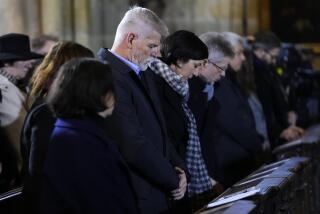A Martyr Is Vindicated in Prague Square : Czechoslovakia: 10,000 gather to remember the ultimate sacrifice of Jan Palach.
- Share via
PRAGUE, Czechoslovakia — Jan Palach was finally vindicated here Tuesday, 21 years after he turned himself into a human torch for freedom.
On Jan. 16, 1969, Palach, inspired by monks who were immolating themselves to protest events half a world away in Vietnam, set himself on fire in Prague’s Wenceslas Square to protest the Soviet-led invasion of his country five months earlier.
The 21-year-old Palach died three days later, a symbol of resistance that shocked, inspired and in some instances shamed his countrymen.
Tens of thousands of people marched silently in fog and drizzle at Palach’s funeral, the last time until Tuesday that Czechoslovaks were permitted to pay him unrestricted public tribute.
For the frightened Soviet puppets who ran the country for most of the intervening years, even one dead hero was too strong a reminder of their hold on power.
Last year an attempt by the dissident group Charter 77 to commemorate the 20th anniversary of Palach’s death led to five nights of clashes between the police and demonstrators. Some say now that this encounter was the real beginning of the revolution that culminated last month in the overthrow of the Communist system.
“I had a feeling then that after 20 years, the great Jan Palach’s ultimate sacrifice was beginning to take on its full meaning,” President Vaclav Havel recalled in a brief address to about 10,000 people gathered at what had been Red Army Square but was renamed Tuesday in Palach’s honor. “Now I’m certain of it.”
Havel, the dissident playwright, was arrested after taking part in the 1989 demonstration and spent the next several months in jail. In November, he emerged as the leader of Civic Forum, the democratic movement, and a little more than a month later he was named president of Czechoslovakia.
“Now the things Palach dreamed about are in front of us,” said Havel, who despite his rank appeared in denim trousers, a parka and scuffed black loafers. “It depends on us whether the dream will indeed be fulfilled.”
The memorial rally began with a funeral dirge played by members of the Czechoslovak Philharmonic Orchestra, followed by a reading from the Bible.
Pavel Chalups, a member of the faculty at Charles University, where Palach was a student, recalled that students and artists were in the forefront of the demonstrations that ignited the revolution in November. It was they, he said, who “took up the torch that fell from Palach’s hand on the 16th of January 21 years ago.”
Civic Forum activist Radim Palous said Palach had made “a statement in opposition to the sense that was already spreading that nothing could be done.” By his sacrifice, Palous said, Palach “held up the honor of our demoralized society.”
The French actor Yves Montand was on hand representing the International Committee for Support of Charter 77. The committee has presented an annual human rights award in Palach’s name since 1979, and this year it went to the students of Czechoslovakia.
“Today, for the first time, the Jan Palach prize is going to be awarded here in Prague,” Montand said. The award carries with it 50,000 French francs, about $10,000.
Accepting it, student leader Martin Klima told the crowd: “What this prize truly means for us is not just money, but a call to duty. We must continue this fight. . . . We the students began this revolution, and we feel responsible for it. I want to say to everyone here: We shall be on guard. Our organization will not enter political life, but we shall be vigilant.”
Sculptor Olbram Zoubek then unveiled a metal cast of the death mask he fashioned the night Palach died. It showed a young face with a broad mouth, high forehead and full cheeks. The eyes were closed.
“In death his face was calm,” Zoubek recalled.
After a minute’s silence, the crowd began to drift away. But a lone male voice rose from somewhere near the middle of the square, and the crowd joined in singing the national anthem. “At long last we could remember Palach the way we always wanted to,” Jiri Podrazky, 17, a trade-school student, told a reporter.
Many in the crowd walked about a mile through Old Town to the top of Wenceslas Square, where Palach had set himself on fire. Bouquets of flowers and multicolored mounds of melted candle wax made a sort of memorial to the dead student near the foot of the statue of King Wenceslas.
In a deathbed interview, Palach had said, “I wanted to express disagreement, to awaken people.” A recording of his words, which had been spirited out of the country, was broadcast Tuesday night as part of a television special. The voice was labored and sounded like that of a much older man.
More to Read
Sign up for Essential California
The most important California stories and recommendations in your inbox every morning.
You may occasionally receive promotional content from the Los Angeles Times.










